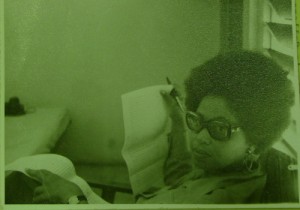“Human beings are magical. Bios and Logos. Words made flesh, muscle and bone animated by hope and desire, belief materialized in deeds, deeds which crystallize our actualities […] And the maps of spring always have to be redrawn again, in undared forms.” (Wynter 1995: 35, drawing on Aimé Césaire)
“[O]ur now immensely large-scale systemic injustices, as extended across the planet, are all themselves as law-likely and co-relatedly indispensable to the institutionalization of our now purely secular and therefore Western and Westernized liberal/neoliberal Man’s homo oeconomicus’s biocosmogonically chartering origin narrative!” (Wynter 2015: 38)
Sylvia Wynter’s formidable canon of work is composed in multiple registers – spanning many creative and intellectual modes of expression. All of these varied expressions are denominated by a profound anticolonial ethos, making up works of hope and redemption, as well as of pain and injustice. Wynter’s central themes include the sociogeny of Fanon and the secularisation of humanism as a formative world event – from which she traces the rise of Europe out of the “epochal redescription” of the human by Renaissance humanists.
She returns repeatedly to that which she defines as the central struggle of the current age, the struggle between “Man” – the over-represented (Western bourgeois) ethnoclass human figure – and the “well-being, and therefore the full cognitive and behavioural autonomy of the human species itself/ourselves”. Wynter identifies aspects of this “central ethnoclass Man vs. Human struggle” as fundamental to global patterns of injustice – from the incarcerated and racialised damnés of the US, to the continent of Africa, to the African diasporic sites, such as Haiti, which are “produced and reproduced” as impoverished.
In line with decolonial thinkers, including Quijano and Mignolo, she centres the concept of race and examines its role in regimes of social domination. The ‘race construct’, Wynter argues, grounded in no anatomical differential correlate, “would enable the now globally expanding West to replace the earlier mortal/immortal, natural/supernatural, human/the ancestors, the gods/God distinction as the one on whose basis all human groups had millennially “grounded” their descriptive statement/prescriptive statements of what it is to be human, and to reground its secularizing own on a newly projected human/subhuman distinction instead” (2003: 264).
Overall Wynter’s scholarship, in the words of Katherine McKittrick (2015: 2), works towards “the possibility of undoing and unsettling – not replacing or occupying – Western conceptions of what it means to be human.”
Essential Reading
Wynter, Sylvia (1962) The Hills of Hebron: A Jamaican Novel. New York: Simon and Schuster.
Wynter, Sylvia (1995) The Pope Must Have Been Drunk, the King of Castile a Madman: Culture as Actuality and the Caribbean Rethinking of Modernity. In A. Ruprecht & C. Taiana (Eds.) Reordering of Culture: Latin America, the Caribbean and Canada in the ‘Hood. Ottawa: Carleton University Press.
Wynter, Sylvia (2003) Unsettling the Coloniality of Being/Power/Truth/Freedom: Towards the Human, after Man, Its Overrepresentation-An Argument. The New Centennial Review 3(3), 257-337
Further Reading
Wynter, Sylvia (1984) The Ceremony Must be Found: After Humanism. Boundary 2, 12/13 (3), 19-70
Wynter, Sylvia (2006) On How We Mistook the Map for the Territory and Reimprisoned Ourselves in Our Unbearable Wrongness of Being, of Désêtre: Black Studies Toward the Human Project. In L. Gordon & J. A. Gordon (Eds.) Not Only the Master’s Tools: African American Studies in Theory and Practice. New York: Paradigm Press.
McKittrick, Katherine (2015) Sylvia Wynter: On Being Human as Praxis. Durham and London: Duke University Press.
Shilliam, Robbie (2019) Sylvia Wynter – “A Dream Deferred: Will the Condemned Rasta Fari ever Return to Africa?” Annotated duplication of an article by Wynter in the British National Archives.
Questions
How do Wynter’s concepts help us to understand contemporary violence?
What is ‘the sociogenic principle’ in Wynter’s conceptualisation?
In what ways does Wynter’s work help to found ‘a new science of human discourse’?
Submitted by Lisa Tilley
